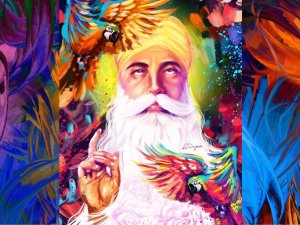I derived the title of my essay from a verse by Guru Nanak in SGGS on page 1412:
ਗਿਆਨ ਹੀਣੰ ਅਗਿਆਨ ਪੂਜਾ
When translated into English, the verse means
“restraining the Light of Truthful Wisdom inevitably leads to the Darkness of falsehood and Ignorance.”
When applied to the everyday practices of religion, it warns that meaningless rituals would inevitably replace the authentic traditions of religion, or Dharam, as prescribed by the sages. In case of the Sikhs, when congregations are deprived of the direct exegeses of the verses by the Founders of the religion, as imbibed in the Guru Granth, the senseless rituals replace the right practices of the faith. Further, the members of the congregation will exhibit enthusiasm and show-off expressions of the ill-advised practices. They may take pride in un-Sikh like rituals, and even celebrate them.
I will include one example in this article later after I narrate the meanings of the darkness and the light as metaphors.
What is Darkness
The darkness can mean many things. However, in the context of the present essay, I describe darkness as religious practices that form a social, moral, and spiritual atmosphere which begins to dictate everyday rituals. In the dark, prejudice becomes more powerful than logic. As a result, the congregations are blindfolded so that the rational judgment is improbable. Guru Granth describes this darkness as,
ਨ ਸਬਦੁ ਬੂਝੈ ਨ ਜਾਣੈ ਬਾਣੀ ॥ ਮਨਮੁਖਿ ਅੰਧੇ ਦੁਖਿ ਵਿਹਾਣੀ ॥ SGGS p. 665
The blind, self-willed manmukh does not comprehend the SABD (teachings of the Guru); the follower of ill-conceived cultural mimetics becomes blind in the darkness of ignorance and lives the precious human life in mental as well as physical misery.
What is Light
One will experience great difficulty in defining the metaphor of intellectual light using English vocabulary as this refers to the light that shines on the human mind. The definition I chose is what I understood from Guru Nanak’s verse as below.
ਨਾਨਕ ਗੁਰਮੁਖਿ ਗਿਆਨੁ ਪ੍ਰਗਾਸਿਆ ਤਿਮਰ ਅਗਿਆਨੁ ਅੰਧੇਰੁ ਚੁਕਾਇਆ ॥੨॥
SGGS, p. 852.
Says Nanak, orientation of human mind toward the spiritual wisdom from Guru enlightens the mind or the intellect so that the black darkness of ignorance is dispelled, rendering the recipient a Gurmukh, the wisdom oriented.
Guru Nanak used the metaphor of light to mean the knowledge which removes the darkness of ignorance from the human mind. The impacted person is content and joyful. Without such knowledge, one remains in the dark, lost in falsehood, and lives a miserable life.
The definition of Light may further become clear from reference to an Islamic saying.
Prophet Muhammad used to make dua (prayer) thus: "Oh Allah place light in my heart and on my tongue light and my ears light and in my sight light, and above me light, and below me light, and to my right light and to my left light."
The Prophet further said: "If anyone travels on the road in search of knowledge, Allah will ease the way to Paradise for him. The angels will lower their wings in their great pleasure with one who seeks knowledge. The inhabitants of the heavens and the earth and even the fish in the deep waters will ask forgiveness for the learned man.
The superiority of the knowledgeable man over the worshipers in Islam is like the superiority of the full moon over the rest of the planets. The scholars are the inheritors of prophets. The prophets didn’t leave behind wealth; they left behind knowledge, and whoever takes this knowledge takes a great fortune" (Abu Dawood, Ibn Majah, Tirmidhi).
Thus, to translate the metaphor of light into the natural language, one can only say that it is that knowledge which removes the darkness of ignorance from the human mind. It makes the impacted person content and joyful. Without such knowledge, one remains ignorant, lost in falsehood, and stay miserable in life.
Is Darkness Really on the Rise?
The answer is yes. Presently we are rapidly drifting into the darkness of ignorance religiously. Those blinded with ignorance are gradually taking over religious institutions everywhere. They may brand anything they like as correct, and thwart criticism of anything. They discourage any reference to the Guru, and as a result, congregations are being rendered the slaves of un-Sikhi rituals. These rituals begin when we are born and continue to blind us to our last breath. Evan the last rites and their periodic memorials are not spared.
The photo made by Ruban and published in BBC journal shows congregation members being encouraged to bring toys as presents to the Guru Granth.
Clergy Promoting Darkness
In Sikhism, the clergies quote “rehat” and verses not included in the Guru Granth to justify everything as right and they thwart condemnation of anything. Often, “rehat” does not support them, but they confuse the audience so they may not verify. Someone said it so beautifully with the admonition that the mores of social groups form “a moral and civil atmosphere through which everything [is] seen and the rational judgment is rendered impossible.” We then start operating in darkness, not even knowing that there is light out there.
Let me take an example from the religious routines periodically made further prevalent in the Sikh congregations.
After finishing the recitations and singing of verses from Sri Guru Granth Sahib, the congregation stands up for the two concluding prayers. The first one was composed by Guru Arjan for recitation by the whole congregation. It, mostly, expresses gratitude in humility to the Creator for the bounties given to everyone. It ends with seeking wisdom to be thankful.
This short prayer is followed by a long community prayer which is recited by only the leading clergy. Closer to the end of this prayer, before asking for the wellbeing of all, the clergy seeks Guru Granth’s kindness in sampling each item of food presented in a large plate to the Guru Granth. To the large plate is also added either a metal glass containing drinking water or a plastic bottle of water recently opened for this occasion. The verse from the Guru Granth often recited at that time is:
ਅਨਿਕ ਪ੍ਰਕਾਰ ਭੋਜਨ ਬਹੁ ਕੀਏ ਬਹੁ ਬਿੰਜਨ ਮਿਸਟਾਏ ॥
ਕਰੀ ਪਾਕਸਾਲ ਸੋਚ ਪਵਿਤ੍ਰਾ ਹੁਣਿ ਲਾਵਹੁ ਭੋਗੁ ਹਰਿ ਰਾਏ ॥੨॥
SGGS, p. 1266.
The above verse is literarily translated to please the donors of the food items served in langar of that day as follows.
We have prepared various sorts of foods in multiple ways and included all kinds of sweet desserts. For that, I cleaned my kitchen pure and sacred. Now, O my Divine king, please sample my dishes thus prepared before they are distributed to the congregation.
The above translation is grossly erroneous and is promoted only to fool the donor into believing that the Guru Granth will sample or taste their cooked food. The real translation of the verse is well elaborated by Bhai Kahan Singh in Gurmat Martand and Professor Gurcharan Singh of the Gurmat Gian Missionary College in his recent book. The correct translation of whole hymn goes like this.
ਰਾਗੁ ਮਲਾਰ ਮਹਲਾ ੫ ਚਉਪਦੇ ਘਰੁ ੧
ੴ ਸਤਿਗੁਰ ਪ੍ਰਸਾਦਿ ॥
One virtual reality manifested in all creation
realized by the Grace of The True Guru:
ਕਿਆ ਤੂ ਸੋਚਹਿ ਕਿਆ ਤੂ ਚਿਤਵਹਿ ਕਿਆ ਤੂੰ ਕਰਹਿ ਉਪਾਏ ॥
What are you so worried about? What are you thinking?
What are you struggling to accomplish?
ਤਾ ਕਉ ਕਹਹੁ ਪਰਵਾਹ ਕਾਹੂ ਕੀ ਜਿਹ ਗੋਪਾਲ ਸਹਾਏ ॥੧॥
What may distress those who are ever protected by the Divine. ||1||
ਬਰਸੈ ਮੇਘੁ ਸਖੀ ਘਰਿ ਪਾਹੁਨ ਆਏ ॥
It is like the rain showering down from the clouds, O my friend companion, when my loving friend walked into my home (heart and mind) as a guest (divine wisdom).
ਮੋਹਿ ਦੀਨ ਕ੍ਰਿਪਾ ਨਿਧਿ ਠਾਕੁਰ ਨਵ ਨਿਧਿ ਨਾਮਿ ਸਮਾਏ ॥੧॥ ਰਹਾਉ ॥
I am meek, but my icon of worship is the Ocean of Mercy. I am captivated in the nine treasures of the Naam, the identity of the Creator. ||1|| Pause to contemplate||
ਅਨਿਕ ਪ੍ਰਕਾਰ ਭੋਜਨ ਬਹੁ ਕੀਏ ਬਹੁ ਬਿੰਜਨ ਮਿਸਟਾਏ ॥
ਕਰੀ ਪਾਕਸਾਲ ਸੋਚ ਪਵਿਤ੍ਰਾ ਹੁਣਿ ਲਾਵਹੁ ਭੋਗੁ ਹਰਿ ਰਾਏ ॥੨॥
In the kitchen of my heart, I have prepared all sorts of foods and sweet deserts in various ways, meaning I gathered various contemplations on a wide range of spiritual teachings and practiced pathways to salvation.
I have made the kitchen of my heart pure and sacred. Now, O my Divine, please guide me in experiencing many aspects of this spirituality.||2||
ਦੁਸਟ ਬਿਦਾਰੇ ਸਾਜਨ ਰਹਸੇ ਇਹਿ ਮੰਦਿਰ ਘਰ ਅਪਨਾਏ ॥
The villains have been destroyed, and my friends are delighted. This is Your Own Mansion and Temple.
ਜਉ ਗ੍ਰਿਹਿ ਲਾਲੁ ਰੰਗੀਓ ਆਇਆ ਤਉ ਮੈ ਸਭਿ ਸੁਖ ਪਾਏ ॥੩॥
When my Playful Beloved walked into my heart (household), then I found total peace.||3||
ਸੰਤ ਸਭਾ ਓਟ ਗੁਰ ਪੂਰੇ ਧੁਰਿ ਮਸਤਕਿ ਲੇਖੁ ਲਿਖਾਏ ॥
In the Society of the Saints, I have the Support and Protection of the Perfect Guru; this is the pre-ordained destiny inscribed upon my forehead.
ਜਨ ਨਾਨਕ ਕੰਤੁ ਰੰਗੀਲਾ ਪਾਇਆ ਫਿਰਿ ਦੂਖੁ ਨ ਲਾਗੈ ਆਏ ॥੪॥੧॥
Humble Nanak has found his Playful Divine Husband.
He shall never suffer in sorrow again. ||4||1||
Purpose of Sikh Congregations
Conformity of behavior in society reflects conformity of thought and sentiment. In establishing the sangats or congregations, Guru Nanak institutionalized Vichaar, the act of thinking and contemplating, the exercise of the mind in any of its higher forms; reflection; cogitation. Vichaar as an exegesis of the verses from the Guru Granth was made the salient feature of the programs and practices in the Sikh congregations. But it is no more practiced as such in roughly half of the gurdwaras in the West. In the gurdwaras where the exegesis is presented, it is often done by illiterate clergy without giving the benefit of anyone questioning the interpretations.
Thus, today the light is being dimmed and darkness being welcome. Let us not let this destructive practice go too far.





